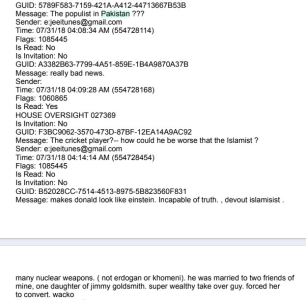- Joined
- Aug 29, 2023
- Runs
- 43,348
In a resurfaced 2018 email, Jeffrey Epstein described Pakistan’s then-rising political figure Imran Khan as “really bad news,” allegedly citing concerns over nuclear weapons and Islamist leanings.
While the origin and intent of Epstein’s comment remain murky, the timing is notable—months before Khan’s election victory. Fast forward to 2022, Khan was ousted from office amid a no-confidence vote, with speculation swirling about U.S. State Department pressure and military complicity.
This wasn’t just regime change—it was narrative control.Khan’s rise disrupted elite comfort zones: a nuclear-armed populist with global reach, Islamic identity, and mass support. The backlash? Coordinated media smears, judicial targeting, and strategic isolation.
Let’s unpack:


While the origin and intent of Epstein’s comment remain murky, the timing is notable—months before Khan’s election victory. Fast forward to 2022, Khan was ousted from office amid a no-confidence vote, with speculation swirling about U.S. State Department pressure and military complicity.
This wasn’t just regime change—it was narrative control.Khan’s rise disrupted elite comfort zones: a nuclear-armed populist with global reach, Islamic identity, and mass support. The backlash? Coordinated media smears, judicial targeting, and strategic isolation.
Let’s unpack:
- Why Khan’s independence triggered global unease
- How foreign and domestic powers aligned to neutralize him
- What this tells us about sovereignty in the age of soft coups







